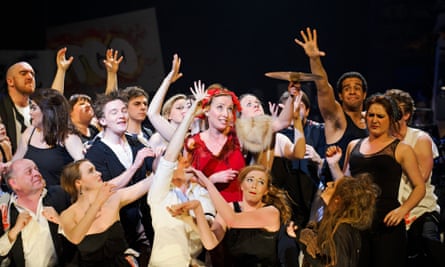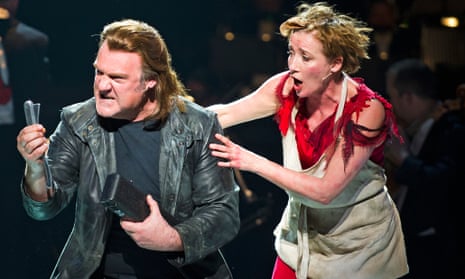First seen in New York in 2014, this semi-staged version of Stephen Sondheim’s dark masterpiece is quite something. But, although it heralds English National Opera’s new policy of embracing all forms of musical theatre, the luxury casting of Bryn Terfel and Emma Thompson in the leads makes it feel like a one-off event. Richly enjoyable as it is, it also doesn’t outclass Jonathan Kent’s superlative production seen recently in Chichester and the West End.
“Semi-staged”, however, seems a misnomer when applied to director Lonny Price’s adventurous approach. As cast and chorus enter and take their places in front of and behind the onstage orchestra, we seem to be in for a concert. But the opening chorus, with its echoes of the Dies Irae, becomes the cue for a revolution as music-stands are violently overturned and formal attire shredded.
One of the evening’s delights, in fact, is the way it uses whatever is to hand to evoke Sondheim’s world. An upturned piano serves as a rostrum, Mrs Lovett cooks her filthy pies on top of a kettledrum and, when the pies acquire a flesh-and-blood savour, they are served from a cymbal. Even the trunk in which the demon barber conceals his first victim has ENO clearly imprinted on the side.
The evening’s chief pleasure lies in the prominence it gives to the performers and Terfel is, in every sense, a massive Sweeney. It may seem odd to hear the chorus observe of Sweeney that “his voice was soft and his manner mild” since Terfel’s tones have a heroic lustre. But what Terfel conveys is the brooding obsessiveness of a man seeking revenge for his wife’s death and his daughter’s enslavement. He phrases the lines with precision so that “There’s no place like London” is heavy with disgust yet, when he hymns the razors that will be the instrument of retribution, Terfel’s voice acquires a lyrical sheen. Terfel is also a strong enough actor to communicate Sweeney’s regret when his missions is finally accomplished.

I feel a touch more equivocal about Emma Thompson’s Mrs Lovett. She is very good, as you would expect, at the comedy of the role. Thompson captures excellently the pie-maker’s deference to power, almost scraping the ground as she greets Judge Turpin. She also displays the right bright-eyed wit in A Little Priest, which celebrates cannibalism in three-four waltz time, and never lets us forget that Mrs Lovett is driven by lust for Sweeney. If I miss anything, it is that sense of a comfortable homebody learning to overcome her moral revulsion at murder which Imelda Staunton unforgettably brought to the role. Once or twice I also found myself longing for the provocative counterpoint that only a full-scale production can provide and that is a key to Sondheim’s work.
One of the great moments of the show balances a love-song to Sweeney’s daughter, Johanna, with the sight of the barber himself slitting throats and sending bodies down a chute into the bakehouse. Here the multiple deaths are symbolised by a spotlit bloodstained hand while the victims creep silently off stage. Inevitably that undercuts Sondheim’s breathtaking contrast of sentiment and brutal savagery.
It remains, however, an exceptional evening in which there is first-rate singing from Katie Hall as Johanna, Matthew Seadon-Young as her ardent wooer and Philip Quast as the villainous Judge Turpin who, we are left in no doubt, achieves a sexual climax during his self-flagellation. The chorus is also in fine voice and the orchestra, conducted by David Charles Abell, captures the rich texture of Sondheim’s harmonies. I’d still prefer the full Sweeney but this version shows that Sondheim’s musical thriller more than justifies its place in the opera house.
- Until 12 April. Box office: 020-7845 9300. Venue: Coliseum, London

Comments (…)
Sign in or create your Guardian account to join the discussion